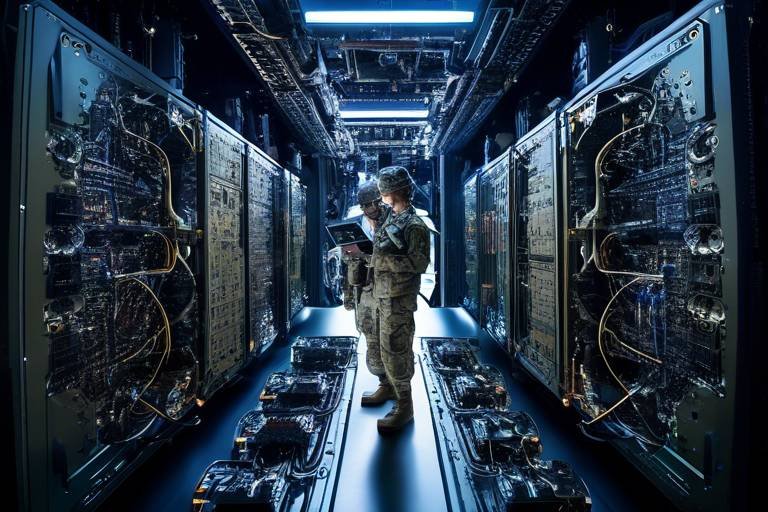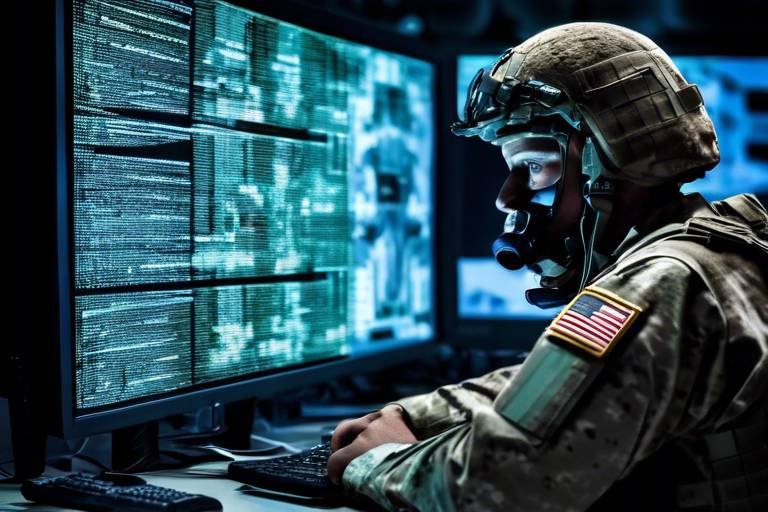The Role of Quantum Computing in Advanced Military Systems
In today's fast-paced world, where technology evolves at lightning speed, quantum computing stands out as a game-changer, especially in the realm of military applications. Imagine a world where complex calculations that once took traditional computers years can now be completed in mere seconds. That's the promise of quantum computing. This revolutionary technology is not just a buzzword; it's reshaping how military forces operate, strategize, and respond to threats. By leveraging the principles of quantum mechanics, militaries can enhance their capabilities, making them more efficient and effective in various operations.
At its core, quantum computing harnesses the strange and fascinating properties of quantum bits, or qubits. Unlike classical bits that exist in a state of either 0 or 1, qubits can exist in multiple states at once, thanks to a phenomenon known as superposition. This allows quantum computers to process vast amounts of data simultaneously, providing a level of computational power that traditional systems simply cannot match. So, what does this mean for military systems? The implications are profound, ranging from improved decision-making processes to enhanced cybersecurity measures.
As we delve deeper into the applications of quantum computing in the military, it becomes clear that its impact is multifaceted. From developing unbreakable encryption methods to optimizing logistics and resource allocation, quantum computing is paving the way for a new era of defense strategies. But with great power comes great responsibility; the ethical considerations surrounding the deployment of such technology are equally important. As military organizations explore the potential of quantum computing, they must navigate the challenges and risks that accompany its implementation.
In this article, we will explore how quantum computing is transforming military capabilities, enhancing decision-making, and reshaping defense strategies through advanced algorithms and unprecedented computational power. We will examine its applications in cryptography, artificial intelligence, and logistics, as well as consider the ethical implications of its use in military contexts. Buckle up, because the future of military operations is about to get a quantum leap forward!
- What is quantum computing? Quantum computing utilizes the principles of quantum mechanics to process information in ways that classical computers cannot, enabling faster and more complex calculations.
- How does quantum computing enhance military capabilities? By improving data processing, encryption methods, and decision-making, quantum computing allows militaries to respond more effectively to threats and optimize their operations.
- What are the ethical concerns surrounding quantum computing in the military? Ethical concerns include the potential for escalation of conflicts, misuse of technology, and the implications of creating unbreakable encryption methods that could hinder intelligence efforts.

Understanding Quantum Computing
Quantum computing is not just a buzzword; it's a revolutionary leap in technology that fundamentally changes how we process information. Unlike classical computers, which use bits as the smallest unit of data (represented as either 0 or 1), quantum computers utilize qubits. These qubits can exist in multiple states simultaneously thanks to a principle called superposition. Imagine flipping a coin; while it's in the air, it can be both heads and tails at the same time. This characteristic allows quantum computers to perform complex calculations at speeds unimaginable with classical systems.
Another key principle of quantum computing is entanglement. When qubits become entangled, the state of one qubit can depend on the state of another, no matter how far apart they are. This means that changes to one qubit can instantaneously affect another, enabling a level of parallelism that vastly enhances computational power. To put it simply, while classical computers are like solitary runners on a track, quantum computers are more like a team of runners working in perfect synchrony, tackling multiple paths at once.
So, why does this matter for military systems? The implications are profound. Quantum computing can process vast amounts of data, analyze complex scenarios, and solve problems that would take classical computers years to figure out. This capability can enhance military strategies, improve logistics, and optimize resource allocation in ways that were previously thought impossible.
To illustrate the differences between classical and quantum computing, consider the following table:
| Feature | Classical Computing | Quantum Computing |
|---|---|---|
| Data Unit | Bit (0 or 1) | Qubit (0, 1, or both simultaneously) |
| Processing Speed | Linear scaling with added bits | Exponential scaling with added qubits |
| Problem Solving | Sequential processing | Parallel processing |
In summary, understanding quantum computing is crucial for grasping its potential applications in military contexts. As we delve deeper into the world of quantum algorithms and their implications for defense strategies, we begin to unlock a new era of technological advancement that could redefine power dynamics on a global scale. Are we ready for this quantum leap?
- What is a qubit? A qubit is the basic unit of quantum information, capable of representing both 0 and 1 at the same time.
- How does quantum entanglement work? Quantum entanglement is a phenomenon where qubits become linked, so the state of one qubit instantly influences the state of another, regardless of distance.
- Why is quantum computing important for the military? Quantum computing can process large datasets and optimize complex military operations, providing a strategic advantage.

Applications in Cryptography
When we think about military communications, one of the first things that come to mind is the need for security. In an age where information can be intercepted with the click of a button, the military must ensure that its communications remain confidential and unbreakable. This is where quantum computing steps in, offering revolutionary advancements in cryptography that could change the game entirely. Unlike classical computing, which relies on bits as the smallest unit of data, quantum computing uses qubits. These qubits can exist in multiple states simultaneously, allowing for complex calculations at speeds unimaginable with traditional computers. This unique property is what makes quantum computing a potential powerhouse in the realm of cryptographic applications.
One of the most exciting developments in quantum cryptography is the concept of Quantum Key Distribution (QKD). QKD enables two parties to generate a shared, secret random key, which can then be used to encrypt and decrypt messages. The beauty of QKD lies in its ability to detect eavesdropping. If a third party tries to intercept the key during transmission, the quantum state of the qubits changes, alerting the communicating parties that their data is compromised. This capability is crucial for military operations, where secure communication can mean the difference between victory and defeat.
Let’s dive deeper into QKD. The process typically involves sending qubits over a fiber optic cable or through free space. The sender, often referred to as Alice, encodes the key into the quantum states of the qubits and sends them to the receiver, known as Bob. Upon receiving the qubits, Bob measures their states to reconstruct the key. This entire process is underpinned by the principles of quantum mechanics, which ensure that any attempt to observe or measure the qubits will disturb their state, thus revealing the presence of an eavesdropper.
The advantages of implementing QKD in military contexts are manifold:
- Enhanced Security: Unlike traditional encryption methods, which can be broken with enough computational power, QKD offers a level of security that is theoretically unbreakable.
- Resistance to Cyber Threats: As cyber threats evolve, QKD stands out as a robust solution that can adapt to new challenges, ensuring military communications remain secure.
- Future-Proofing: As quantum computers become more prevalent, QKD provides a way to stay ahead of potential vulnerabilities that could arise from advancements in computational power.
Despite its promise, the deployment of QKD in military frameworks is not without challenges. The technology is still in its infancy, and several technical and logistical hurdles need to be addressed:
- Infrastructure Requirements: Implementing QKD necessitates a significant investment in new infrastructure, including specialized hardware and secure communication channels.
- Distance Limitations: Quantum signals can degrade over long distances, which poses a challenge for widespread military communication.
- Integration with Existing Systems: Military organizations must find ways to integrate QKD with their current communication systems without compromising security or functionality.
In summary, as we delve into the world of quantum cryptography, it becomes clear that the applications of quantum computing in this field are not just theoretical; they are paving the way for a new era of military communications. With QKD at the forefront, the potential for secure, unbreakable military communications is within our grasp. However, addressing the challenges of implementation will be crucial for realizing this potential.
- What is Quantum Key Distribution? QKD is a method of secure communication that uses quantum mechanics to securely distribute encryption keys.
- How does QKD ensure security? QKD detects eavesdropping attempts by measuring the quantum states of qubits, which change if intercepted.
- What are the main challenges of implementing QKD? Key challenges include infrastructure requirements, distance limitations, and integration with existing military systems.

Quantum Key Distribution
Quantum Key Distribution (QKD) is not just a buzzword in the tech world; it represents a significant leap forward in the realm of secure communications, especially for military applications. Imagine being able to send messages that are virtually impossible to intercept or decode. That's the promise of QKD. At its core, QKD leverages the principles of quantum mechanics to create a secure communication channel. Unlike classical methods that rely on mathematical complexity, QKD uses the fundamental nature of quantum particles to ensure that any attempt to eavesdrop on the transmission will be detected immediately. This revolutionary approach transforms the way military operations can communicate, ensuring that sensitive information remains confidential.
The mechanics of QKD are fascinating. When a sender (often referred to as Alice) transmits quantum bits (qubits) to a receiver (Bob), any interception by a third party (Eve) will disturb the qubits' state. This disturbance can be detected, alerting Alice and Bob to the potential breach. The beauty of QKD lies in its ability to provide a level of security that is theoretically unbreakable, making it a game-changer for military communications where the stakes are incredibly high.
In practice, implementing QKD involves sophisticated technology and infrastructure. Military organizations must invest in quantum communication systems that can handle the unique requirements of QKD. This includes specialized hardware for generating and detecting qubits, as well as secure channels for transmitting them. The potential for QKD to revolutionize military communications is immense, but it also comes with its own set of challenges.
One of the primary benefits of QKD in military contexts is its enhanced security. Traditional encryption methods can be vulnerable to advances in computing power, particularly with the rise of quantum computers themselves. In contrast, QKD offers a robust defense against such threats. Additionally, the ability to detect eavesdropping in real-time means that military operations can maintain a higher level of operational security, reducing the risk of sensitive information falling into enemy hands.
However, the road to fully integrating QKD into military frameworks is not without obstacles. The technical challenges include the need for advanced quantum communication equipment, which can be expensive and complex to deploy. Furthermore, logistical issues such as the distance over which QKD can effectively operate pose significant hurdles. Current QKD systems are limited by the distance that quantum signals can travel without degradation. While researchers are actively working on solutions, such as quantum repeaters, these technologies are still in development and may take time to become viable for widespread military use.
In conclusion, Quantum Key Distribution holds immense potential for enhancing the security of military communications. As the technology matures and the challenges are addressed, we can expect to see QKD play a crucial role in safeguarding sensitive military operations against an increasingly sophisticated landscape of cyber threats.
- What is Quantum Key Distribution? - QKD is a secure communication method that uses quantum mechanics to distribute encryption keys, ensuring that any eavesdropping attempts are detectable.
- How does QKD differ from traditional encryption? - Unlike traditional methods that rely on mathematical algorithms, QKD's security is based on the laws of quantum physics, making it theoretically unbreakable.
- What are the main challenges in implementing QKD in military settings? - The primary challenges include the high cost of quantum communication technology and limitations in the distance over which QKD can effectively operate.
- Can QKD be used in real-time military operations? - Yes, QKD can provide real-time security for communications, allowing military operations to maintain confidentiality while detecting any potential breaches.

Benefits of QKD
Quantum Key Distribution (QKD) is not just a buzzword; it's a groundbreaking technology that offers a plethora of benefits, especially in military applications. Imagine a world where communication is not only fast but also unbreakably secure. QKD achieves this by utilizing the principles of quantum mechanics, ensuring that any attempt to eavesdrop on the communication will be detected instantly. This is akin to having a security guard who not only watches over your valuables but also alerts you the moment someone tries to breach the perimeter.
One of the most significant advantages of QKD is its enhanced security. Traditional encryption methods rely on complex algorithms that, while secure, can potentially be cracked with enough computational power and time. However, QKD fundamentally changes the game. By using quantum bits (qubits) to encode information, it creates a system where the act of interception alters the data being transmitted. This means that if a hacker tries to listen in, the original message is compromised, alerting the sender and receiver to the breach.
Moreover, QKD provides resilience against future threats. As quantum computers become more prevalent, they pose a significant risk to current encryption methods. With QKD, military communications can stay ahead of the curve, ensuring that even as technology evolves, their data remains secure. This is especially crucial in defense scenarios where sensitive information must be protected from adversaries who may leverage advanced computing capabilities.
Additionally, implementing QKD can lead to improved operational efficiency. By ensuring that communication channels are secure, military personnel can focus on their missions without the constant worry of data breaches. This peace of mind can enhance decision-making processes, allowing for quicker and more efficient responses in critical situations. Furthermore, QKD can facilitate secure communication between various branches of the military, ensuring that information flows seamlessly and securely across all levels of operation.
In summary, the benefits of QKD are not just theoretical; they have practical implications that can significantly enhance military operations. From providing unparalleled security to improving operational efficiency, QKD stands as a beacon of hope in an era where cyber threats are ever-evolving. As we look towards the future, the integration of QKD into military frameworks will undoubtedly play a pivotal role in shaping secure communication strategies.
- What is Quantum Key Distribution (QKD)?
QKD is a secure communication method that uses quantum mechanics to enable two parties to generate a shared, secret random key, which can be used for encrypted communication.
- How does QKD enhance security?
QKD enhances security by ensuring that any attempt to intercept the key will be detected, thus protecting the integrity of the communication.
- Can QKD be used in real-time military operations?
Yes, QKD can be implemented in real-time military operations to ensure secure communications between units, which is crucial for effective decision-making.
- What are the challenges of implementing QKD?
Challenges include the need for specialized equipment, the requirement for a direct line of sight between communicating parties, and the current limitations in distance for effective QKD.

Challenges of Implementation
Implementing quantum key distribution (QKD) in military frameworks is no small feat. While the potential benefits of enhanced security are enticing, several challenges must be addressed before QKD can be fully integrated into existing military systems. One of the primary hurdles is the technical complexity involved in deploying quantum technology. Unlike traditional encryption methods, QKD relies on the principles of quantum mechanics, which can be difficult to understand and apply. Military personnel must undergo extensive training to grasp these concepts, which can be a significant barrier to widespread adoption.
Moreover, the logistical challenges of deploying QKD systems are substantial. For instance, the infrastructure required for quantum communication is vastly different from that of classical networks. Quantum signals are highly sensitive and can be easily disrupted by environmental factors such as temperature fluctuations and electromagnetic interference. This means that military installations would need to invest in specialized equipment and facilities to ensure reliable communication channels. The costs associated with this transition can be daunting, especially for defense budgets that are often stretched thin.
In addition to these technical and logistical issues, there are also interoperability concerns. Many military systems are built on legacy technologies that may not be compatible with quantum systems. This incompatibility can create significant challenges in integrating QKD with existing communication networks, leading to potential vulnerabilities during the transition period. The military must ensure that all systems can work together seamlessly, which often requires extensive testing and validation.
Furthermore, the regulatory landscape surrounding quantum technologies is still evolving. As governments and military organizations begin to recognize the importance of quantum computing, they must also navigate the complex web of regulations that govern its use. This can lead to delays in implementation as organizations seek to ensure compliance with national and international standards.
Finally, there’s the issue of public perception. As military applications of quantum technology become more prominent, concerns about privacy and the potential for misuse will likely arise. The military must engage in transparent communication with the public to address these concerns and build trust in the use of quantum technologies for national defense.
In summary, while the promise of quantum key distribution is immense, the path to implementation is fraught with challenges. Addressing these hurdles will require a concerted effort from military leaders, scientists, and policymakers to ensure that quantum technologies can be harnessed effectively and ethically.
- What is quantum key distribution?
Quantum key distribution is a secure communication method that uses quantum mechanics to generate and share encryption keys, making it virtually unbreakable. - Why is QKD important for the military?
QKD enhances the security of military communications, protecting sensitive information from interception and cyber threats. - What are the main challenges of implementing QKD?
Challenges include technical complexity, logistical issues, interoperability with legacy systems, regulatory hurdles, and public perception concerns. - How does QKD differ from traditional encryption?
Unlike traditional encryption methods, which rely on mathematical algorithms, QKD uses the principles of quantum mechanics to secure communication.

Quantum Algorithms for Defense
In the ever-evolving landscape of military operations, the integration of quantum algorithms offers a groundbreaking approach to enhancing defense strategies. These algorithms leverage the principles of quantum mechanics to perform computations at speeds and efficiencies that classical computers simply cannot match. Imagine a world where military logistics are optimized in real-time, where resource allocation is not just a guess but a calculated decision backed by the immense computational power of quantum systems. This is not science fiction; this is the potential reality that quantum algorithms bring to the defense sector.
One of the most exciting aspects of quantum algorithms is their ability to solve complex problems that involve numerous variables and constraints. For instance, consider the problem of troop deployment across various terrains and conditions. Traditional algorithms might take hours, if not days, to analyze all possible outcomes and determine the most effective strategy. However, a quantum algorithm can evaluate multiple scenarios simultaneously, drastically reducing the time needed to make critical decisions. This capability can be a game-changer in situations where every second counts.
Furthermore, the application of quantum algorithms extends beyond logistics. They can also enhance predictive analytics in military operations. By analyzing vast amounts of data from various sources, quantum algorithms can identify patterns and forecast potential threats with remarkable accuracy. For example, they can process intelligence reports, satellite imagery, and social media activity to predict enemy movements or gauge public sentiment in conflict zones. This level of insight allows military leaders to make informed decisions, potentially averting crises before they escalate.
To illustrate the versatility of quantum algorithms in defense, consider the following applications:
- Resource Allocation: Optimizing the distribution of supplies and personnel based on real-time data.
- Combat Simulation: Running complex simulations to prepare for various scenarios and outcomes.
- Threat Detection: Identifying and responding to emerging threats faster than traditional systems.
However, the implementation of quantum algorithms is not without its challenges. Developing these algorithms requires a deep understanding of both quantum mechanics and the specific needs of military operations. Additionally, the transition from classical systems to quantum systems involves significant logistical hurdles, including training personnel and integrating new technologies into existing frameworks.
In conclusion, quantum algorithms hold the promise of transforming military operations by enhancing efficiency, accuracy, and decision-making capabilities. As the defense sector continues to explore these advanced computational methods, the potential for improved outcomes in various military applications is immense. The future of warfare may very well depend on how effectively we can harness the power of quantum computing to ensure national security and strategic advantage.
- What are quantum algorithms? Quantum algorithms are computational methods that utilize the principles of quantum mechanics to solve problems more efficiently than classical algorithms.
- How can quantum algorithms improve military logistics? By processing vast amounts of data simultaneously, quantum algorithms can optimize troop deployment and resource allocation in real-time.
- What challenges exist in implementing quantum algorithms in the military? Key challenges include the need for specialized training, integration with existing systems, and the development of algorithms tailored to military needs.
- Are there ethical concerns surrounding the use of quantum computing in defense? Yes, ethical considerations include the potential escalation of conflicts and the risk of misuse of advanced technologies.

Enhancing AI and Machine Learning
In the rapidly evolving landscape of technology, quantum computing stands out as a game-changer, especially in the realm of artificial intelligence (AI) and machine learning (ML). Traditional computing systems, while powerful, often struggle with the vast amounts of data generated in modern military operations. Enter quantum computing, a technology that not only accelerates data processing but also enhances the capabilities of AI and ML algorithms, leading to unprecedented advancements in military decision-making.
Imagine trying to find a needle in a haystack. A classical computer might sift through each piece of hay, one by one, while a quantum computer can leverage the principles of superposition and entanglement to look at multiple possibilities at once. This ability to process multiple outcomes simultaneously allows for faster and more efficient data analysis, which is crucial in military contexts where time is of the essence.
One of the most exciting aspects of quantum computing is its potential to improve predictive analytics. Military operations rely heavily on forecasting outcomes based on various scenarios. With quantum-enhanced AI, military strategists can analyze complex datasets more effectively, leading to better-informed decisions. For instance, when assessing potential threats or planning logistics for troop movements, the ability to crunch data from multiple sources in real-time can significantly enhance operational effectiveness.
Moreover, the integration of quantum computing into AI systems can lead to the development of smarter algorithms. These algorithms can learn from data patterns at an accelerated pace, adapting to new information much faster than their classical counterparts. This capability is particularly important in combat scenarios where conditions can change rapidly, and decisions must be made on the fly. The synergy between quantum computing and AI can create systems that not only react quicker but also anticipate actions, providing military leaders with a strategic edge.
However, it’s essential to recognize that while the potential is vast, the implementation of quantum computing in AI and ML comes with its challenges. The technology is still in its infancy, and there are significant hurdles to overcome, including the need for robust quantum hardware and the development of algorithms that can fully exploit quantum advantages. Additionally, integrating these systems into existing military frameworks will require careful planning and substantial investment.
As we look to the future, the intersection of quantum computing with AI and ML holds tremendous promise. It could redefine how military operations are conducted, making them more efficient, responsive, and ultimately more effective. The potential for real-time data processing and decision-making could lead to a new era of military strategy, one where information superiority is achieved through advanced quantum technologies.
- What is quantum computing?
Quantum computing is a type of computation that uses quantum bits (qubits) to perform operations at speeds and efficiencies far beyond those of classical computers. - How does quantum computing enhance AI?
Quantum computing enhances AI by enabling faster data processing and the development of smarter algorithms that can learn and adapt more quickly to new information. - What are the challenges of implementing quantum computing in military AI?
Challenges include the need for advanced quantum hardware, the development of suitable algorithms, and the integration of these technologies into existing military frameworks. - What are some potential military applications of quantum-enhanced AI?
Potential applications include predictive analytics for threat assessment, logistics optimization, and real-time decision-making in combat scenarios.

Data Processing Capabilities
In the realm of military operations, can be the difference between success and failure. Imagine a battlefield where every second counts; the ability to process vast amounts of data in real-time can provide a significant strategic advantage. This is where quantum computing steps in, transforming how military forces analyze and utilize information. Unlike classical computers, which use bits as the smallest unit of data, quantum computers leverage qubits, allowing them to perform multiple calculations simultaneously. This fundamental difference enables quantum computers to tackle complex problems that would take classical systems an impractical amount of time to solve.
One of the standout features of quantum computing in military applications is its ability to handle large datasets with unparalleled efficiency. For instance, consider a scenario where military analysts need to sift through thousands of satellite images to identify potential threats. A classical computer might take hours or even days to analyze this information, but a quantum computer can process these images in a fraction of the time. This speed not only enhances operational efficiency but also provides military leaders with actionable insights almost instantly, allowing for quicker decision-making.
Moreover, the integration of quantum computing into military data processing can significantly improve predictive analytics. By analyzing historical data and identifying patterns, quantum algorithms can forecast potential threats or logistical challenges. This predictive capability is akin to having a crystal ball that not only sees the present but also gives a glimpse into the future. For example, if a certain region has shown a pattern of unrest, quantum-enhanced systems can analyze various factors—such as troop movements, weather conditions, and local sentiments—to predict when and where a conflict might arise.
To illustrate the potential impact of quantum computing on data processing, consider the following table:
| Aspect | Classical Computing | Quantum Computing |
|---|---|---|
| Data Processing Speed | Hours to Days | Seconds to Minutes |
| Data Handling Capacity | Limited by Memory | Scalable with Qubits |
| Predictive Analytics | Basic Pattern Recognition | Advanced Forecasting |
| Resource Allocation | Static Models | Dynamically Optimized |
As military operations become increasingly data-driven, the demand for advanced data processing capabilities will only grow. Quantum computing not only meets this demand but also redefines what is possible in terms of speed and accuracy. The potential applications are vast, ranging from optimizing supply chains to enhancing battlefield simulations. The military's ability to leverage quantum computing for data processing is not just a technological upgrade; it is a paradigm shift that could alter the landscape of modern warfare.
- What is quantum computing? Quantum computing is a type of computation that uses quantum bits (qubits) to process information in ways that classical computers cannot, enabling faster and more complex calculations.
- How does quantum computing improve military data processing? It allows for the simultaneous processing of multiple data streams, significantly speeding up analysis and providing actionable insights in real-time.
- What are the implications of quantum computing for military strategy? Enhanced data processing can lead to better decision-making, improved predictive analytics, and more efficient resource allocation, ultimately changing the dynamics of military operations.
- Are there any risks associated with quantum computing in the military? Yes, potential risks include the misuse of technology and ethical concerns regarding escalation in warfare.

Real-Time Decision Making
In the fast-paced world of military operations, the ability to make real-time decisions can mean the difference between success and failure. Imagine a battlefield where every second counts, and the stakes are incredibly high. This is where quantum computing steps in, offering a revolutionary approach to decision-making processes. By harnessing the power of quantum algorithms, military leaders can process complex data at speeds that were previously unimaginable. This capability allows for rapid analysis of situations and the generation of actionable insights that can be implemented almost instantaneously.
One of the most exciting aspects of quantum-enhanced decision-making is its potential to integrate vast amounts of data from various sources. Think of it as having a supercharged brain that can sift through mountains of information—everything from satellite imagery to troop movements—within moments. This enhanced data processing capability is not just about speed; it's about accuracy and relevance. In high-stakes environments, where misinformation can lead to catastrophic outcomes, having access to precise and timely information is crucial.
Moreover, quantum computing allows for the simulation of multiple scenarios in real-time, providing military strategists with a comprehensive view of potential outcomes. For instance, if a commander is faced with a decision to engage an enemy force, quantum algorithms can quickly model various strategies, taking into account the strengths and weaknesses of both sides. This simulation capability is akin to playing multiple chess games simultaneously, where each move is calculated based on the opponent's potential responses. As a result, military leaders can make informed decisions that are not only reactive but also proactive, anticipating enemy actions and adjusting their strategies accordingly.
However, the implementation of quantum computing in real-time decision-making is not without its challenges. The technology is still in its infancy, and integrating it into existing military frameworks requires significant investment and training. Additionally, there are concerns about the reliability of quantum systems, especially in high-pressure scenarios where any lag or error could have dire consequences. Despite these hurdles, the potential benefits of quantum computing in enhancing real-time decision-making are too significant to ignore.
As we look to the future, it’s clear that quantum computing will play a pivotal role in shaping military operations. The ability to make informed, rapid decisions in the heat of battle could redefine how conflicts are approached, ultimately leading to more efficient and effective military strategies. In the coming years, we can expect to see further advancements in this field, paving the way for a new era of military intelligence and operational success.
- What is quantum computing? Quantum computing utilizes the principles of quantum mechanics to process information in ways that classical computers cannot, allowing for faster and more complex computations.
- How does quantum computing enhance decision-making in the military? It enables the rapid processing of vast datasets, simulates multiple scenarios in real-time, and provides actionable insights that can be crucial in high-stakes situations.
- What are the main challenges of implementing quantum computing in military operations? Key challenges include the technology's current infancy, integration with existing systems, and the need for extensive training and investment.

Future of Military Operations
The future of military operations is on the brink of a revolutionary transformation, largely driven by the advancements in quantum computing. Imagine a battlefield where decisions are made not just by human intuition but through complex calculations performed in a fraction of a second. This is not science fiction; it’s the potential reality as quantum technology integrates into defense strategies. As nations race to harness this technology, the implications for global power dynamics and military effectiveness are staggering.
One of the most significant changes we can anticipate is the shift in strategic planning. Quantum computing allows for the analysis of vast amounts of data at unprecedented speeds. This means that military leaders can simulate various scenarios with incredible accuracy, helping them to devise strategies that are not only more effective but also more adaptable to changing conditions on the ground. Picture a chess game where your opponent's every possible move is calculated before they even make it; that's the level of foresight quantum computing can offer.
Furthermore, the integration of quantum-enhanced artificial intelligence (AI) into military operations could lead to autonomous systems that are capable of making real-time decisions. These systems, powered by quantum algorithms, could assess threats, allocate resources, and even engage in combat scenarios with minimal human intervention. While this could increase operational efficiency, it also raises significant ethical questions about the role of machines in warfare and the potential for unintended consequences.
In terms of global power dynamics, the countries that successfully implement quantum technology in their military frameworks may gain a decisive edge over their adversaries. This technological race could lead to a new arms race, not of conventional weapons but of quantum capabilities. Nations may invest heavily in research and development to ensure they are not left behind, potentially destabilizing existing geopolitical relationships.
Moreover, the potential for cyber warfare could be redefined. Quantum computing could break current encryption methods, rendering many of today's security protocols obsolete. This could lead to an escalation in cyber-attacks, as nations seek to exploit vulnerabilities in their opponents' defenses. As such, military operations will need to evolve not only in terms of offensive capabilities but also in defensive strategies to protect vital information.
As we look towards this future, it’s essential to consider the ethical implications of deploying quantum technology in military operations. The prospect of autonomous weapons systems raises questions about accountability and the potential for misuse. Will we be able to control these powerful systems, or could they lead to unintended escalations in conflict? These are questions that policymakers, military leaders, and ethicists must grapple with as we forge ahead into this new era.
In conclusion, quantum computing is set to redefine military operations, offering unparalleled advantages in decision-making, strategy, and operational efficiency. However, with these advancements come significant challenges and ethical considerations that must be addressed to ensure that this technology is used responsibly and effectively.
- What is quantum computing? Quantum computing is a type of computation that uses quantum bits (qubits) to perform calculations at speeds unattainable by classical computers.
- How will quantum computing impact military operations? Quantum computing will enhance decision-making, optimize logistics, improve cybersecurity, and enable real-time data processing in military contexts.
- What are the ethical concerns surrounding quantum computing in the military? Ethical concerns include the potential for escalation in warfare, accountability for autonomous systems, and the risk of cyber threats.
- Can quantum computing be used for secure communications? Yes, quantum key distribution (QKD) is a method that uses quantum mechanics to create secure communication channels that are resistant to eavesdropping.

Ethical Considerations
As we delve deeper into the realm of quantum computing and its applications in military systems, we must pause to consider the ethical implications that accompany such advancements. The potential for quantum technologies to revolutionize warfare is both exciting and daunting. On one hand, these innovations can enhance national security and protect against emerging threats. On the other hand, they raise critical questions about the morality of their use, the potential for escalation of conflicts, and the risk of misuse.
One of the most pressing ethical concerns is the prospect of an arms race fueled by quantum capabilities. Just as the development of nuclear weapons led to a precarious balance of power, the advent of quantum computing could spark a new race among nations to achieve superiority in military technology. This scenario poses a significant risk: if one country gains a substantial advantage, it may feel emboldened to act aggressively, potentially destabilizing global peace. The question then arises: how do we manage this technological race without tipping the scales towards conflict?
Moreover, the use of quantum computing in military applications could lead to unprecedented surveillance capabilities. Imagine a world where military forces can process and analyze vast amounts of data in real-time, tracking movements and communications with pinpoint accuracy. While this could enhance operational effectiveness, it also brings forth concerns about privacy and the potential for authoritarian control. Are we prepared to accept a future where our every move is monitored by advanced algorithms? The balance between security and individual freedoms is delicate, and we must tread carefully.
Additionally, the ethical implications extend to the potential for misuse of quantum technologies. As with any powerful tool, there is always the risk that it could be employed for malicious purposes. The possibility of quantum computing being used to break encryption or manipulate data raises alarms about cybersecurity. Military systems that rely on quantum algorithms could become targets for adversaries, leading to catastrophic outcomes. Therefore, it is imperative to establish robust frameworks and guidelines that govern the use of quantum technologies in military contexts.
In light of these considerations, it becomes evident that a collaborative approach is essential. Engaging with ethicists, technologists, policymakers, and the public can help shape a responsible path forward. We must ask ourselves: how can we ensure that the advancements in quantum computing serve to protect and enhance our societies rather than endanger them? The dialogue surrounding these ethical considerations is not just a formality; it is a crucial step in ensuring that we harness the power of quantum computing for the greater good.
In summary, as we stand on the brink of a quantum revolution in military systems, we must remain vigilant about the ethical ramifications. The balance between innovation and morality will define the future of warfare and security. By fostering an open dialogue about these issues, we can navigate the complexities of this new frontier responsibly.
- What are the main ethical concerns regarding quantum computing in the military? The primary concerns include the potential for an arms race, increased surveillance capabilities, and the risk of misuse for malicious purposes.
- How can we ensure responsible use of quantum technologies? Engaging a diverse group of stakeholders, including ethicists and policymakers, can help create guidelines and frameworks for the responsible deployment of quantum technologies.
- What role does public opinion play in the ethical considerations of military quantum computing? Public opinion is crucial as it can influence policy decisions and hold military and governmental organizations accountable for their technological advancements.

Conclusion and Future Outlook
The integration of quantum computing into military systems represents a seismic shift in how defense strategies are formulated and executed. As we stand on the brink of this technological revolution, it’s crucial to acknowledge the profound implications that quantum computing will have on military operations. Not only does it enhance our capabilities in areas such as cryptography and artificial intelligence, but it also offers unprecedented opportunities for optimizing resources and decision-making processes.
Looking ahead, the future of military operations will likely be characterized by a reliance on quantum-enhanced systems that can process vast amounts of data at lightning speed. Imagine a battlefield where real-time analytics are not just a luxury but a standard, allowing commanders to make informed decisions in the blink of an eye. This capability could redefine the rules of engagement, making conflicts more strategic and less reliant on sheer force.
However, with great power comes great responsibility. As military organizations begin to adopt quantum technologies, they must also grapple with the ethical implications of their use. The potential for escalation in conflicts, misuse of quantum capabilities, and the arms race in quantum technologies could lead to destabilization on a global scale. Therefore, it’s essential to establish robust frameworks for governance and ethical considerations surrounding the deployment of such advanced technologies.
In summary, the transformative impact of quantum computing on military systems cannot be understated. It is imperative for military leaders, policymakers, and technologists to work collaboratively to harness its potential while safeguarding against its risks. The future outlook is not just about technological advancement; it’s about ensuring that these advancements contribute positively to global security and stability.
- What is quantum computing? Quantum computing is a type of computation that takes advantage of quantum mechanics to process information in fundamentally different ways than classical computers.
- How does quantum computing affect military operations? It enhances capabilities in areas such as cryptography, artificial intelligence, and logistics, enabling faster and more efficient decision-making.
- What are the ethical concerns surrounding quantum computing in the military? Concerns include the potential for escalation in conflicts, misuse of technology, and the implications of an arms race in quantum capabilities.
- Will quantum computing replace traditional computing in military applications? While it will not completely replace traditional computing, it will complement it, providing enhanced capabilities for specific tasks.
- What is Quantum Key Distribution (QKD)? QKD is a method of secure communication that uses quantum mechanics to ensure that any attempt to eavesdrop on the communication can be detected.
Frequently Asked Questions
- What is quantum computing and how does it differ from classical computing?
Quantum computing is a revolutionary technology that leverages the principles of quantum mechanics to process information in ways that classical computers cannot. Unlike classical computers, which use bits as the smallest unit of data (either 0 or 1), quantum computers use qubits that can exist in multiple states simultaneously. This allows quantum computers to perform complex calculations at unprecedented speeds, making them particularly powerful for applications like cryptography and optimization.
- How does quantum computing enhance military capabilities?
Quantum computing enhances military capabilities by providing advanced algorithms and computational power that can significantly improve decision-making processes. For instance, it can optimize logistics, resource allocation, and strategic planning. Additionally, the ability to process vast amounts of data efficiently means that military operations can gain actionable insights faster than ever before, leading to more informed decisions in critical situations.
- What is Quantum Key Distribution (QKD) and why is it important?
Quantum Key Distribution (QKD) is a method of secure communication that uses quantum mechanics to enable two parties to generate and share a secret key. This key can then be used for encrypting messages, ensuring that communications remain confidential. QKD is crucial for military operations because it offers a level of security that is theoretically unbreakable, making it resistant to cyber threats and eavesdropping.
- What are the benefits of using QKD in military communications?
The benefits of using QKD in military communications include enhanced security, as it prevents unauthorized access to sensitive information. Additionally, QKD provides real-time detection of any interception attempts, alerting users to potential security breaches. This level of protection is essential in military contexts where the stakes are incredibly high and information integrity is paramount.
- What challenges are faced in implementing quantum computing in military systems?
Implementing quantum computing in military systems comes with several challenges, including technical hurdles related to the development and maintenance of quantum hardware. There are also logistical issues, such as integrating quantum technologies into existing military frameworks and ensuring that personnel are trained to use them effectively. Furthermore, the high cost of quantum technology can be a significant barrier to widespread adoption.
- How can quantum computing accelerate AI and machine learning in military applications?
Quantum computing can accelerate AI and machine learning by enabling faster processing of large datasets. This capability allows military systems to analyze data more efficiently, leading to improved predictive analytics and decision-making. By harnessing the power of quantum algorithms, military applications can achieve quicker insights and adapt to rapidly changing scenarios in real time.
- What ethical considerations arise from deploying quantum computing in military contexts?
The deployment of quantum computing in military contexts raises several ethical considerations, including concerns about escalation in warfare and the potential for misuse of technology. As quantum capabilities advance, there is a risk of creating a new arms race, where nations compete to develop superior quantum technologies. It's essential to engage in discussions about the ethical implications and establish guidelines to prevent harmful applications of quantum advancements.



















